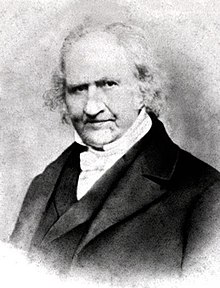Maximilian Jacobi
Carl Wigand Maximilian Jacobi , also Karl Wigand Maximilian Jacobi (born April 10, 1775 in Düsseldorf , † May 18, 1858 in Siegburg ), was a German physician, secretary and chief medical officer and head of the Provincial Sanatorium in Siegburg. He is considered the founder of modern herbal medicine .
Life
Carl Wigand Maximilian Jacobi was a son of the philosopher and writer Friedrich Heinrich Jacobi and brother of the politician Johann Friedrich Jacobi .
On May 16, 1798 he married Anna Frederike Petrina Claudius (1777-1856), a daughter of the poet Mathias Claudius . They had four children. The eldest daughter Juliane Clementine Jacobi (1799–1886) married Christian Friedrich Kling (1800–1862), professor of theology in Bonn and later pastor and dean in Marbach , in 1826 . Bernhard August Jacobi (1801–1843) was Protestant pastor and president of the Westphalian Provincial Synod. Daughter Bertha Carolina Franziska Jacobi (1804–1874) married Karl Heinrich Sack , professor of theology and pastor in Bonn, later consistorial councilor in Magdeburg. Theodora Anna Rebekka Jacobi (1807–1890) had been married to Carl Wilhelm Theodor Voigt (1804–1838), pastor in Siegburg and Thorn, since 1831. Their daughter Clarissa Voigt (* October 4, 1832, † March 10, 1894) had been married since 1855 to the later known psychiatrist Bernhard von Gudden , who was his assistant doctor in Siegburg from 1848 to 1851. Clarissa Gudden was the mother of nine children, some of whom became well-known psychiatrists.
Education
Maximilian Jacobi studied from 1793 to 1795 in Jena and then in Göttingen . After a brief internship in Edinburgh , he received his doctorate in medicine from the University of Erfurt on February 21, 1797 .
Act
Jacobi worked in Vaals in 1799 , then in Eutin , from 1803 to 1804 in London , where he had received surgical training in 1802, and from 1805 to 1811 in Munich . In Salzburg he worked as a senior physician from 1812 to 1815 . In Düsseldorf he was active as a government and medical councilor from 1816 to 1824.
On January 1, 1825, he took over the management of the newly founded insane asylum in Siegburg . It was the first mental hospital in the Rhineland . It was housed in the Michaelsberg Abbey, which was dissolved in 1803 . In 1831 this institution looked after 384 mentally ill people. Jacobi managed the institution until his death. Three years before his death, he was appointed to the Secret Medical Council.
His book Insane Asylums was translated into English in 1841.
Private life
Jacobi was involved in the creation of the Protestant parish in Siegburg in 1829. His correspondence with Johann Wolfgang von Goethe , who was a family friend, is well known. He was also friends with Christian Friedrich Nasse and shared with him an interest in the physical manifestations of mental illness.
Works
Jacobi published numerous books such as:
- with Franz Xaver Häberl : Yearbooks of the Sanitary System in the Kingdom of Baiern , 1810.
- Collections for the medicine of mental diseases , 3 volumes, Elberfeld 1822–1830.
- Observations on the pathology and therapy of diseases associated with insanity , Elberfeld 1830.
- About the establishment and establishment of the insane sanatoriums with a detailed description of the insane sanatorium in Siegburg , Berlin 1834.
- Annals of the insane sanatorium in Siegburg , vol. 1 (no further published), Leipzig 1837.
- The main forms of mental disorders in their relationship to medicine , Vol. 1 (no further published), Leipzig 1844 ( digitized version ).
He also translated texts by Herodotus and Thucydides .
literature
- Melchior Josef Bandorf : Jacobi, Karl Wigand Maximilian . In: Allgemeine Deutsche Biographie (ADB). Volume 13, Duncker & Humblot, Leipzig 1881, pp. 593-596.
- Gabriel Busch: Raw or tender Benedictine abbey - mental hospital - prison - places of Christian love . Rheinlandia Verlag Klaus Walterscheid, Siegburg 2000, ISBN 3-935005-02-4 .
- Jacobi . In: Heinrich August Pierer , Julius Löbe (Hrsg.): Universal Lexicon of the Present and the Past . 4th edition. tape 8 . Altenburg 1859, p. 698-699 ( zeno.org ).
- Theodor Rutt : Land on Victory and Rhine: History - Culture - Economy . Scientific archive, Urkunde-Bild-Chronic GmbH, Bonn 1960, p. 178.
- Johannes Steudel : The psychiatrist Maximilian Jacobi. In: Heimatbuch der Stadt Siegburg II. Siegburg 1967, p. 284 f. and 776-794.
- Heinrich Schipperges : Jacobi, Maximilian. In: New German Biography (NDB). Volume 10, Duncker & Humblot, Berlin 1974, ISBN 3-428-00191-5 , pp. 226-228 ( digitized version ).
- Salina Braun: "As for the main cause of his mental illness, ... self-defilement". Disease attributions and treatment practices in the Irren-Heil-Anstalt Siegburg (1825–1878). The fall of Georg v. G. In: Würzburg medical history reports. Volume 25, 2006, pp. 43-61, here: pp. 47 ff.
Web links
- Bernhard von Gudden in the Rheinische Geschichte portal (Gudden was Jacobi's assistant doctor in Siegburg 1848–1851)
- Biography of Carl Wigand Maximilian Jacobi In: Biographical Archive of Psychiatry (BIAPSY) .
Individual evidence
- ^ Edward Shorter: A History of Psychiatry: From the Era of the Asylum to the Age of Prozac . John Wiley & Sons, New York 1997, p. 39.
- ↑ Heinrich Bauer: Maximilian Jacobi's participation in the establishment and development of the Protestant community in Siegburg. In: Andrea Korte-Böger (Ed.): Raw or tender: Benedictine abbey, insane asylum - prison. Places of Christian love. Siegburg 2000, pp. 24-30.
| personal data | |
|---|---|
| SURNAME | Jacobi, Maximilian |
| ALTERNATIVE NAMES | Jacobi, Carl Wigand Maximilian |
| BRIEF DESCRIPTION | Prussian government and chief medical officer |
| DATE OF BIRTH | April 10, 1775 |
| PLACE OF BIRTH | Dusseldorf |
| DATE OF DEATH | May 18, 1858 |
| Place of death | Siegburg |
